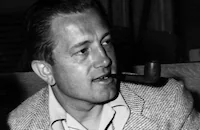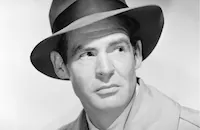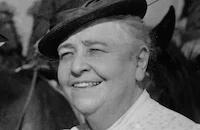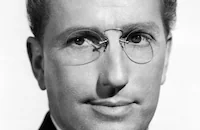Tender Comrade

Brief Synopsis
Cast & Crew
Edward Dmytryk
Ginger Rogers
Robert Ryan
Ruth Hussey
Patricia Collinge
Mady Christians
Film Details
Technical Specs

Synopsis
Granted a one-night leave before being shipped out for overseas duty, soldier Chris Jones visits his wife Jo. After an affectionate reunion, Jo and Chris bid farewell at the train station and dream of the day that Chris will return home. Jo collapses, sobbing, as Chris's train departs, but composes herself enough to go to her job at the Douglas Aircraft Factory. While eating lunch with three of her fellow workers, Jo proposes that they pool their resources and rent a house together. The three women: Barbara Thomas, an embittered, unfaithful wife whose husband Pete is in the Navy; Doris Dumbrowski, whose sudden wedding to her soldier boyfriend on the eve of his overseas departure prevented them from consummating their marriage; and Helen Stacey, whose husband and son are both in the service, accept Jo's idea, and they move in together, vowing to run their household as a democracy. Alone in her bedroom that night, Jo looks longingly at Chris's photograph and fondly remembers the day he proposed: Jo is drying her hair in her parents' backyard when Chris comes to ask her to marry him. Although sweethearts since childhood, Jo accuses Chris of flirting with other girls and picks a fight with him. As Jo furiously brushes her hair, Chris finally convinces her to say yes. Jo's thoughts then return to the present and she drifts off to sleep. The next day, as the women struggle to clean house, they decide to advertise for a housekeeper. Manya, a German woman who left her homeland because her people "murdered democracy," applies for the job. When Manya tells them that her husband is fighting in the U.S. Army and that she views keeping house for the four defense workers as part of her contribution to the war effort, the women decide to hire Manya and pool their earnings, splitting in five parts whatever is left after paying expenses. When the butcher sends the women an extra pound of bacon, Manya becomes indignant and denounces the idea of hoarding. After Barbara questions the necessity of rationing and preaches isolationism, Jo accuses her of not considering the consequences of her ideas. Their argument is interrupted when Barbara's date arrives. Although the others disapprove of Barbara's infidelity, she ignores their objections. Barbara is about to leave on her date when a radio broadcast announces the sinking of the aircraft carrier Yorktown during the Battle of Midway and names Pete as one of the sailors who is missing in action. The news upsets Barbara, who cancels her date, and makes Jo feel guilty about her harsh words. Later that night, while she talks to Chris's photograph, Jo confesses her regrets about snapping at Barbara and remembers the time her quick temper was aimed at her husband: One night after dinner, Jo feels ignored because Chris is reading a newspaper article. In a bid for attention, she tries to dig a splinter out of his hand with a needle, and when he suggests that she sew the missing buttons on his shirt instead, Jo has a tantrum and complains about his working long hours. After Chris explains that he is trying to save some money to insure her financial security when he goes to war, Jo issues him an ultimatum: either he works less or she will get a job. When Chris agrees to Jo's terms, they make up and Jo's thoughts return to the present. One afternoon, Jo skips work and when she returns home, she announces that she is pregnant. After giving birth to her son, whom she names Chris Jr., Jo gazes at Chris's photo and remembers the time that she was practicing diaper folding: After Jo explains to her surprised husband that she is not pregnant but bought the diapers for a friend's baby shower, Chris confides that he wants to postpone having a child because he fears that he will soon be drafted and wants to be present when the baby is born. Jo is brought back to the present by the sound of her baby's cries. When Jo returns home from the hospital, Barbara tells her that Pete has been located in a Honolulu hospital and vows to renew their marriage. Soon after, Helen receives a letter from her husband with the proud news that their son has been promoted to major. Next, Mike surprises Doris by coming home for an unexpected leave. Mike's presence reminds the other women of their missing husbands, and they scramble to cook him a meal consisting of their husbands' favorite dishes. As Mike and Doris share their first married evening together, the doorbell rings. Jo answers it and immediately knows that something is wrong when she is handed a telegram. Upstairs in her bedroom, Jo opens the telegram and reads the news that Chris has been killed in battle. Cradling her infant son, Jo remembers Chris's farewell words and shows the baby the photograph of his father. After comforting little Chris with the thought that his father died so that he could live in a better world, Jo leaves the room and tells herself that "she'll take it on the chin like a good guy, like a soldier's wife should."

Director

Edward Dmytryk
Cast

Ginger Rogers

Robert Ryan

Ruth Hussey

Patricia Collinge

Mady Christians

Kim Hunter

Jane Darwell

Richard Martin
Mary Forbes

Richard Gaines
Patti Brill
Euline Martin
Edward Fielding
Claire Whitney
Donald Davis
Bobby Andersen
Jane Farrar
Tom Burton
Michael Road

Freddie Mercer
Crew
C. Bakaleinikoff
Gertrude Bank
Mel Berns
R. Campbell
Carroll Clark
Albert S. D'agostino
Al Fields
Roland Gross
N. Harden
Leigh Harline
Edith Head
David Hempstead
Millard Kaufman
L. Lang
P. Mccoy
Roy Meadows
Mel Merrihugh
Russell Metty
D. Panter
Renie
Harry Scott
Darrell Silvera
George Spencer
James G. Stewart
William Swingley
Sherman Todd
J. Vernon
Vernon L. Walker
Bob Wright

Photo Collections
Videos
Movie Clip





Hosted Intro
Film Details
Technical Specs

Articles
Tender Comrade
It is Jo who broaches the idea to her friends (all of whom work as Rosie the Riveters at a home front defense plant) that instead of squandering their money on separate rents, they should pool their money and rent an enormous communal house. That message of solidarity and frugality applies to every aspect of Tender Comrade which combines wartime propaganda of wives staying vigilant on the home front, with a moving melodrama about this varied group of women pining for their husbands to return.
In numerous flashbacks, director Edward Dmytryk establishes how Jo's husband Chris (Robert Ryan) helped inspire Jo's can-do attitude and prepared his wife for his inevitable departure for the war. But Jo is the heart and soul of the drama, toeing the line alone, and later caring for their newborn child while her husband is away fighting.
Jo's roommates, intended to show various aspects of the WWII home front experience, are a truly diverse group. There is the glamorous, flinty Barbara Thomas (Ruth Hussey) who openly cheats on her husband while he serves in the war, the innocent newlywed Doris Dumbrowski (Kim Hunter), matron Helen Stacey (Patricia Collinge) who has both a husband and a son serving in the war, and the housekeeper Manya Lodge (Mady Christians) whose husband is also stationed overseas.
Like several other more famous members of the Tender Comrade cast (including Kim Hunter who was later blacklisted), Christians would go on to be accused of Communist sympathies during the notorious House Un-American Activities Committee (HUAC) trials. After being blacklisted, Christians was unable to find film work and later died of a cerebral hemorrhage.
Ironically, despite the intensely patriotic message of Tender Comrade, both screenwriter Dalton Trumbo and director Dmytryk were also singled out as alleged communists during Senator Joseph McCarthy's infamous HUAC witch hunt. Both were among the original blacklisted group of writers, directors and producers branded the Hollywood Ten for refusing to testify to Congress about alleged Communist involvement.
After serving 11 months in prison for contempt of Congress, Trumbo made his way back to Hollywood, writing 30 scripts under a pseudonym before officially returning to above ground screenwriting in 1960 with Exodus and Spartacus.
The communal living situation of the women in Tender Comrade was later pointed to as an expression of the screenwriter's and director's ideology. In her autobiography, Ginger: My Story, the actress wrote, "Some of Dalton Trumbo's dialogue had a Communistic turn, which upset me deeply. I complained to the front office and sent notices to those in authority, including director Edward Dmytryk, that they would have to make a finer sifting of this script if they wanted me to continue with the film. In order to satisfy me, David Hempstead, the producer, gave the other actors the dialogue, 'Share and share alike! ' that I was unhappy about. I still hold strong feelings against communism because it is atheistic and anti-God."
Dmytryk was left embittered by the HUAC experience, writing in his autobiography of Tender Comrade, "Their motto is 'share and share alike,' which sounded quite innocently democratic when we made the film, but which turned up to haunt me a few years later when I was instructed that the real motto of a democracy is 'Get what you can while you can and the devil take the hindmost.'"
Tender Comrade was a hit upon its release with Photoplay offering a fair appraisal of its combination of genuine emotion and schmaltz: "a poignant, merry, and sometimes heartbreaking story...There are spots that climb the heights of emotional appeal but there are many flat surfaces in between."
RKO producer David Hempstead suggested Robert Ryan as the male lead for the film after seeing favorable preview cards for Ryan's roles in Bombardier (1943), The Sky's the Limit (1943) and Edward Dmytryk's Behind the Rising Sun (1943). Rogers was initially unimpressed with the actor after screening bits of his films and said he looked mean and was too big (he was 6 foot 3 inches). After a brief face to face meeting between Ryan and Rogers surreptitiously arranged by Hempstead, the actress passed Hempstead a piece of paper that said "I think this is the guy." Tender Comrade turned out to be Ryan's big film break.
Ryan was an intercollegiate boxing champ while at Dartmouth (his father pushed him into the ring to toughen him up after his son took a precocious interest in Shakespeare) and ironically enough, played a boxer in his screen debut, the B-picture Golden Gloves (1940).
Rogers got her start in show business at age 14 when she won the Texas State Charleston contest and later became a regular performer on the vaudeville stage. Rogers became best known to movie audiences for the 10 song and dance musicals she made with Fred Astaire, though she proved her talents in comedy and drama as well. Rogers received her first Oscar® in another Dalton Trumbo-scripted drama, Kitty Foyle (1940) based on a Christopher Morley novel about a poor girl in love with a rich socialite. By 1945 Rogers had clearly established her value in Hollywood no matter what film genre she performed in, as the highest paid actress in movies.
Director: Edward Dmytryk
Producer: David Hempstead and Sherman Todd
Screenplay: Dalton Trumbo
Cinematography: Russell Metty
Production Design: Carroll Clark and Albert S. D'Agostino
Music: Leigh Harline
Cast: Ginger Rogers (Jo Jones), Robert Ryan (Chris Jones), Ruth Hussey (Barbara Thomas), Patricia Collinge (Helen Stacey), Mady Christians (Manya Lodge), Kim Hunter (Doris Dumbrowski).
BW-102m. Closed captioning.
by Felicia Feaster

Tender Comrade
TCM Remembers - Kim Hunter
KIM HUNTER, 1922-2002
Kim Hunter, the versatile, distinguished actress who won the Supporting Actress Academy Award for her portrayal as the long-suffering Stella in A Streetcar Named Desire (1951) and appeared as Dr. Zira in three Planet of the Apes movies, died in her Greenwich Village apartment from an apparent heart attack on September 11, 2002. She was 79.
Born Janet Cole in Detroit on November 12, 1922, where her mother was a concert pianist, she made her professional debut at 17 with a small theatre company in Miami. She gained notice immediately with her strong voice and alluring presence, and eventually studied at the Actors' Studio in New York.
She made a striking film debut in an eerie, low-budget RKO horror film, The Seventh Victim (1943), produced by Val Lewton. She played a similar ingenue role in another stylish cult flick, When Strangers Meet (1944) - a film directed by William Castle and notable for featuring Robert Mitchum in one of his first starring roles. Hunter's big break came two years later when Michael Powell and Emeric Pressburger cast her in their splendid romantic fantasy, Stairway to Heaven (1946).
Despite her growing popularity as a screen actress, Hunter returned to the stage to make her Broadway debut as Stella in Tennessee Williams'A Streetcar Named Desire (1951). When Elia Kazan adapted the production for the silver screen, she continued her role as Stella opposite Marlon Brando, and won an Oscar as best supporting actress. A few more film roles followed, but sadly her screen career entered a lull in the late 1950s, after Hunter, a liberal Democrat, was listed as a communist sympathizer by Red Channels, a red-hunting booklet that influenced hiring by studios and the Television networks. Kim was blacklisted from both mediums despite never having been labeled a Communist, yet as a strong believer in civil rights she signed a lot of petitions and was a sponsor of a 1949 World Peace Conference in New York. She was widely praised in the industry for her testimony to the New York Supreme Court in 1962 against the publishers of Red Channels, and helped pave the way for clearance of many performers unjustly accused of Communist associations.
Hunter spent the next few years on the stage and didn't make a strong impression again in films until she was cast as Dr. Zira in the Planet of the Apes (1968), as a simian psychiatrist in the classic science fiction film. The success of that film encouraged her to continue playing the same character in two back-to-back sequels - Beneath the Planet of the Apes (1970) and Escape from the Planet of the Apes (1971). Hunter spent the remainder of her career on the stage and television, but she a terrific cameo role in Clint Eastwood's Midnight In The Garden Of Good And Evil (1997), one of her last films. She is survived by her daughter Kathryn, from her first marriage to William Baldwin, and her son Sean, from her marriage to actor and producer Robert Emmett.
By Michael T. Toole
TCM REMEMBERS J. LEE THOMPSON, 1914 - 2002
Oscar-nominated director J. Lee Thompson died August 30th at the age of 88. Though he worked in several genres, Thompson was best-known for his action films. Thompson was born in Bristol England on August 1, 1914. After graduating from college he became a playwright and it was the appearance of one of his plays on London's famous West End that got him noticed by the British film studio, Elstree. His first filmed script was The Pride of Folly in 1937 and others appeared sporadically until his career was side-tracked during the war when Thompson served in the RAF as a B-29 tail gunner. (He also reportedly worked as a dialogue coach on Hitchcock's Jamaica Inn, 1939.) Thompson's directorial debut came in 1950 when he adapted his own play Double Error to the screen as Murder Without Crime. Throughout the decade he directed a variety of dramas and comedies until hitting it big in 1958 with Ice Cold in Alex (released in the US minus 50 minutes under the title Desert Attack). It was nominated for three BAFTAs and was enough of a commercial success that Thompson landed the film that made his career: The Guns of Navarone (1961). This enormous international hit snagged Thompson an Oscar nomination for Best Director. He immediately followed that with the original Cape Fear (1962) and his reputation was set. Though Thompson remained active almost three more decades he didn't reach that level again. He worked on Westerns (Mackenna's Gold, 1969), horror films (Eye of the Devil, 1967), literary adaptations (Huckleberry Finn, 1974) and others. During this time, Thompson directed two Planet of the Apes sequels but was kept most busy working with Charles Bronson, for whom he directed nine films. Thompson's last film was in 1989.
KATRIN CARTLIDGE, 1961 - 2002
The news of actress Katrin Cartlidge's death at the age of 41 has come as a shock. It's not just the age but the thought that even though Cartlidge was already a major actress--despite a slender filmography--she held out the promise of even greater work, a promise that so few artists of any type can make. "Fearless" is perhaps the word most often used to describe Cartlidge but emotions are never enough for an actor; much more is required. Director Mike Leigh said she had "the objective eye of an artist" while remarking on her "her deep-seated suspicion of all forms of woolly thinking and received ideas."
Cartlidge was born in London on May 15, 1961. Her first acting work was on the stage, in tiny independent theatres before she was selected by Peter Gill for the National Theatre. Cartlidge also worked as a dresser at the Royal Court where she later made one of her final stage appearances. She began appearing in the popular British TV series Brookside before making her first film in 1985, Sacred Hearts. A small role in the Robbie Coltrane-Rik Mayall vehicle Eat the Rich (1987) followed before Cartlidge had her first leading role in Mike Leigh's scathing Naked (1993).
Cartlidge never took a safe approach in her films. She told The Guardian that "I try to work with film-makers who I feel will produce something original, revealing and provoking. If something provokes a reaction, it's well worth doing." You can see this in her choice of projects. Before the Rain (1994) dramatized violence in Macedonia in the wake of the Yugoslavian break-up and made Cartlidge something of a star in the area. She appeared in Lars Von Trier's controversial look at redemption, Breaking the Waves (1996), Leigh's sharply detailed story of aging friends Career Girls (1997), as one of Jack the Ripper's victims in From Hell (2001), as a call girl trying to leave the business in Clair Dolan (1998) and in the Oscar-winning film about Bosnia-Herzegovina, No Man's Land (2001). Her last work included a BBC adaptation of Crime and Punishment (2002), playing Salvador Dali's wife Gala in the BBC comedy-drama Surrealissimo (2002) and an appearance in Rosanna Arquette's directorial debut, Searching for Debra Winger (also 2002), a documentary about women in the film industry.
Cartlidge died September 7th from septicaemia brought on by pneumonia.
By Lang Thompson
TCM Remembers - Kim Hunter
Quotes
Trivia
Screenwriters Dalton Trumbo and Edward Dmytryk did not conceal their Communist sympathies, and Ginger Rogers began noticing anti-American speeches in her dialogue. Upon complaining, the speeches were given to other actresses.
Notes
The film opens with the following poem titled "My Wife" written by Robert Louis Stevenson: "Teacher, Tender Comrade, Wife. A fellow farer true through life. Heart-whole and soul-free. The August Father gave to me." A news item in Hollywood Reporter credits Harold Lewis as assistant director, but his participation in the released film has not been confirmed. Materials contained in the RKO Archives Production Files at the UCLA Arts Library-Special Collections add that Katina Paxinou was originally slated to play the role of "Manya." Ruth Hussey was borrowed from M-G-M and Kim Hunter from David O. Selznick's company to appear in this film. Modern sources credit John Miehle with still photography. According to materials contained in the RKO Archives Script Files at the UCLA Arts Library-Special Collections, RKO shot several different endings for this film. The picture originally concluded with "Jo's" "Little Guy" speech to her baby. According to the Los Angeles Times review and the final script dated September 4, 1943, this ending was shown at the film's Los Angeles premiere on December 29, 1943. Although the film was not nationally released until mid-1944, RKO screened the film in Los Angeles in 1943 in order to qualify Rogers' performance for an Academy Award. (She did not receive an award or nomination.)
According to a news item in Hollywood Reporter, in January 1944, the studio decided to shoot new footage to emphasize the "chin-up" qualities that motivate "Jo" to continue her job as a war-worker despite the tragedy that has befallen her. In one of the endings contained in the Script Files, after learning of "Chris's" death, Jo joins her fellow workers at the plant. The final released version of the film ends with Jo's "chin-up speech" on the stairs followed by a long shot of "Jo" and "Chris" walking hand-in-hand on a hilltop.
An August 1943 news item in Hollywood Reporter notes that the studio considered changing the title for fear that the audience would think that the film was a story about Russia.
In 1947, Rogers' mother, Lela Rogers, testifed at a HUAC hearing that screenwriter Dalton Trumbo was a Communist and that the film was an example of Communist propaganda. According to a 1947 New York Times article, at that hearing, Robert Stripling, the committee investigator, testified that Rogers refused to say the lines "share and share alike-that's democracy" because she believed they contained Communist overtones. Trumbo and director Edward Dmytryk were members of the so-called "Hollywood 10," who refused to testify about Communist infiltration in the motion picture industry. For their refusal to cooperate, they were convicted of contempt of Congress and sentenced to one year in prison and a $1,000 fine. After his release from prison, Dmytryk went into self-imposed exile in England, where he directed three films. In 1951, he returned to the United States and gave testimony in the second round of committee hearings. As a result of that testimony, he was removed from the industry's blacklist. For additional information about HUAC, for Crossfire. Olivia De Havilland and June Duprez starred in a January 22, 1945 Lux Radio Theatre broadcast of the story.















